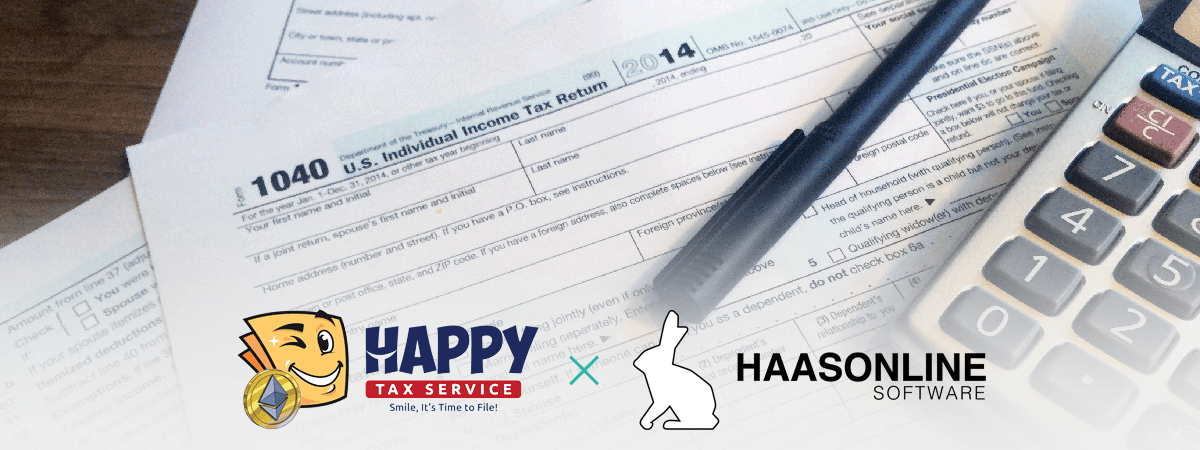Between the IRS lawsuit against Coinbase and the tax reform that took place in the last few days of 2017, things are shaping up for a complicated tax year. There has been a lot of confusion within the cryptocurrency community regarding how, when, and in what amount they will have to pay taxes this year.
Nothing replaces the wisdom and experience of a trained professional, especially when it comes to taxes. However, before setting up your first meeting, here are some helpful tax tips that can get you started off on the right foot.
Note: We will be doing a live Q&A with Mario Costanz from HappyTax on our YouTube live stream with our chief communications officer, Raynaldo Rivera, on April 14, 2018 @ 10AM PST. Please Join our Telegram if you want to participate in having your questions answered live.
Most cryptocurrency transactions are taxable.
Every time you sell, spend, or trade one cryptocurrency for another is a taxable event. This is one of the most expansive tax policies out there, and it catches many investors by surprise. So, for example, if you bought Bitcoin at $9,000 and then used this Bitcoin to buy Ripple when Bitcoin was up to $10,000, you must pay taxes on that $1,000 increase. You will have to pay taxes again when you sell, trade, or use your Ripple. This gets complicated quickly, especially on exchanges that don’t use U.S. dollars.
Cryptocurrencies are taxed under the capital gains rules.
Cryptocurrencies are subject to capital gains tax rules. Capital gains apply whenever you buy or sell valuable property, like real estate or art. Capital gains tax rates depend on how long you held the taxable asset. If you hold your cryptocurrency for more than one year, you will most likely pay a lower tax rate. However, this depends on your particular financial circumstances, so be sure to consult with an accountant before planning your trades.
Even if you never cashed out, you may owe substantial taxes on last years’ trades.
If you made huge gains in your cryptocurrency portfolio in 2017 that have been wiped out in the down market this year, you may still be facing a big tax bill. The IRS allows some losses to be carried forward, but a loss cannot be applied retroactively. If you made profitable cryptocurrency trades in 2017, talk to an accountant to make sure you’re managing your tax liability properly.
Tax reform impacts cryptocurrency tax.
The Tax Cuts and Jobs Act is the most major tax reforms we’ve seen in decades, and it affects everyone. Tax reform has limited certain exemptions that taxpayers used to use to avoid crypto taxes, including the like-kind exemption rule. Tax reform also limited business’ abilities to carry over losses and deduct for theft, which can raise substantial liability for crypto investors in 2018.
It’s your responsibility to make sure your taxes are done right.
It’s your responsibility to figure out your tax liability, including the cost basis used to determine your capital gains tax liability. If you don’t have a solid method for figuring your cost basis, the IRS can assign your basis as $0 and charge you much more. There are several ways to determine your cost basis, and a qualified cryptocurrency accountant can advise you about which method will minimize your tax liability.
The IRS can come after you for errors in your tax returns going a few years back. That means you may get a question or a demand for proof from the IRS for a tax decision you barely even remember. As a result, keeping good records is critical. A good accountant can help keep your files in order for IRS inspection.
Mining income is taxable.
Cryptocurrency earned through mining is taxed as regular income. However, once you sell the coins you mined, you must pay capital gains tax on the difference between the price of the coin when you mined it and the price of the coin when you sold it.
Cryptocurrency is an investment vehicle for the people. For the most part, those of us who jumped on the cryptocurrency bandwagon last year have never had to deal with things like capital gains tax, like-kind exchanges, futures contracts, or other things that experienced investors have a lot of exposure to. As a result, this may be the first tax season many of us will be working with an accountant.
If You Bought or Sold Cryptocurrency, Consult a Tax Professional
This year, taxes are more confusing than ever. This is particularly true for cryptocurrency investors. Some coin traders are surprised to discover how much they actually owe. Reporting requirements for cryptocurrency trades are tough, and for many investors, the sheer volume of their trading is so great, tax preparation software can’t even handle it. As a result, some of the most active cryptocurrency traders are forced to find an accountant who understands the crypto space and how virtual currencies fit into the tax code.
While 2017 is long gone, the new year creates new opportunities for effective tax planning. A good accountant can help taxpayers prepare their returns and plan for their tax liability. Our friends at CryptoTaxPrep by Happy Tax boasts a talented group of cryptocurrency accountants specially trained to meet the needs of virtual coin traders.
Regardless of whether it’s due to evasion or confusion, the IRS knows that cryptocurrency income is being under-reported. As a result, the agency is hot on the heels of just about every major cryptocurrency investor. Given how much attention the IRS is giving to cryptocurrency activity, virtual currency investors need to make sure that their returns are done right. And not consulting with a tax professional this year would be a big mistake. Reporting requirements are particularly tough for cryptocurrency investors, and the IRS imposes additional requirements on money transacted through foreign exchanges and income from hard forks. This makes for a tough tax year, and cryptocurrency investors are needing good tax advice now more than ever



